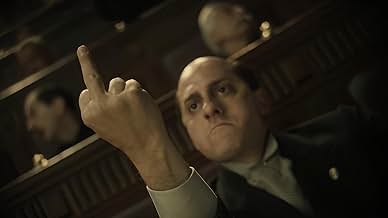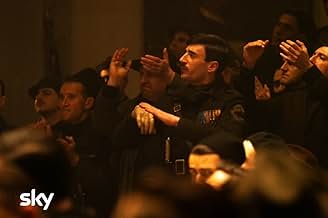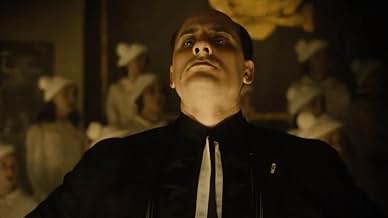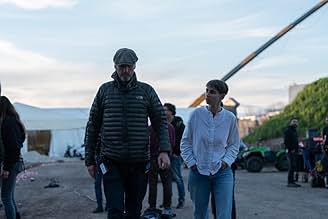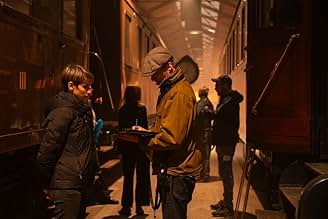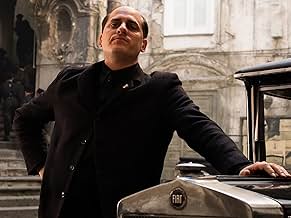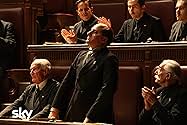Narra a ascensão ao poder do ditador italiano Benito Mussolini em uma história de um país que se rendeu à ditadura.Narra a ascensão ao poder do ditador italiano Benito Mussolini em uma história de um país que se rendeu à ditadura.Narra a ascensão ao poder do ditador italiano Benito Mussolini em uma história de um país que se rendeu à ditadura.
- Prêmios
- 2 vitórias no total
Explorar episódios
Avaliações em destaque
I mainly focus on the film aspects. Without getting too deep into it, I try to gauge how much truth versus mystification is presented. I don't align with either the right or the left.
This series is one of the most beautiful I have seen in recent times. Mussolini's dialogue with the camera is pure gold. The way he conveys his thoughts, mocks the viewer, and shares his confessions keeps you glued to the screen and makes you feel involved in the story. Marinelli is fantastic! Those who criticize him likely do so for reasons unrelated to his performance. Francesco Russo is superb, and Barbara Chichiarelli is perfect!
This series is one of the most beautiful I have seen in recent times. Mussolini's dialogue with the camera is pure gold. The way he conveys his thoughts, mocks the viewer, and shares his confessions keeps you glued to the screen and makes you feel involved in the story. Marinelli is fantastic! Those who criticize him likely do so for reasons unrelated to his performance. Francesco Russo is superb, and Barbara Chichiarelli is perfect!
A solid recommendation from me. I really enjoyed the flow, acting, action, and storytelling. I always find it fascinating how such a destructive force can rise to power-what forces support it, oppose it, and which ones get swayed, and why. The quality of the series is excellent. For me, it belongs in the same league as Der Untergang and Unsere Mütter, unsere Väter.
What makes this series particularly compelling is its exploration of the political landscape in Italy at the time. The power struggles between the socialists, the monarchy, and other factions add layers of intrigue, showing how different forces either resisted or enabled the rise of authoritarianism. The shifting allegiances and moral dilemmas make for gripping storytelling.
On top of that, the action sequences are intense and well-executed. The battles, street clashes, and political confrontations feel raw and realistic, adding weight to the historical events. The choreography, cinematography, and pacing of these scenes keep the tension high, making it a visually and emotionally engaging experience.
What makes this series particularly compelling is its exploration of the political landscape in Italy at the time. The power struggles between the socialists, the monarchy, and other factions add layers of intrigue, showing how different forces either resisted or enabled the rise of authoritarianism. The shifting allegiances and moral dilemmas make for gripping storytelling.
On top of that, the action sequences are intense and well-executed. The battles, street clashes, and political confrontations feel raw and realistic, adding weight to the historical events. The choreography, cinematography, and pacing of these scenes keep the tension high, making it a visually and emotionally engaging experience.
Compelling plot, striking photography, excellent acting by Marinelli. Above all, a solid portrayal of a particular historical period.
Much more to be appreciated if you speak Italian, because Marinelli's performance is truly a masterpiece, both from a linguistic and human point of view. M is a winning example of how history should be represented in cinema: hard and raw, without unnecessary words or unnecessary events based on fiction.
I really recommend its viewing. However, do not expect a simple and straightforward viewing; the story is purely described, there is no shortage of harsh scenes and I felt like some stories missed some details.
What is interesting is that the meaning of some of the pictures goes beyond the simple political figure to the man, with his fears and weaknesses. Things that, of the figure of Mussolini, never really came out of that period.
Excellent cinematic work.
Much more to be appreciated if you speak Italian, because Marinelli's performance is truly a masterpiece, both from a linguistic and human point of view. M is a winning example of how history should be represented in cinema: hard and raw, without unnecessary words or unnecessary events based on fiction.
I really recommend its viewing. However, do not expect a simple and straightforward viewing; the story is purely described, there is no shortage of harsh scenes and I felt like some stories missed some details.
What is interesting is that the meaning of some of the pictures goes beyond the simple political figure to the man, with his fears and weaknesses. Things that, of the figure of Mussolini, never really came out of that period.
Excellent cinematic work.
Best Most Engrossing TV In Years.
I don't know how much of the Parliamentary madness is historically accurate, how much the birth of Fascism was accurate either, what I do know this series is giving me and anyone who takes the time to engage with the movement the phenomenon called Fascism build by a human being who cut out the representative instinct, the fundamental purpose of Legitimate Representation, the instruments that since the Athenian experiment was found to successfully create, control the masses. The tools to create a society.
Mussolini brought this idea into our world. The use of chaos into politics. That by changing your position, saying the insayable, thinking the unthinkable you can take control of millions of people.
Mussolini proposed to do the impossible and made people believe he had done it. He unbalanced his opponents. The whole body politic couldn't construct a coherent strategy to combat him.
Sensible, pragmatic policies are forgotten as those who think otherwise gasp for breath.
And Benito with his grasp of how the prolaterate thought. How he instructed them to believe "His Message". The truth was never considered. Benito was the 1st. All our modern demi gods use El Duce play book. No Hitler. No Franco. No Pinochet. No Pol Pot. No Saddam without Mussolini.
El Duce thought them all.
And we laugh at him. Maybe its us that are the fools.
Who'll be next to use his bag of tricks?
So now we have this magnificent expose of control by an English director an Italian writer and Rupert Murdochs Sky putting the money, the distribution, the lesson on how not to be a politician in front of us.
The "Making Of" might be a mini series for another day.
To think till now "Gomorrah" was the height of our appreciation for Italian modern story telling. And season 1 ends with Matteotti murder. What a rich vein of contemporary instruction lays before us.
By the way. This is Magnificent. A 10 all day long and double on Sunday.
I don't know how much of the Parliamentary madness is historically accurate, how much the birth of Fascism was accurate either, what I do know this series is giving me and anyone who takes the time to engage with the movement the phenomenon called Fascism build by a human being who cut out the representative instinct, the fundamental purpose of Legitimate Representation, the instruments that since the Athenian experiment was found to successfully create, control the masses. The tools to create a society.
Mussolini brought this idea into our world. The use of chaos into politics. That by changing your position, saying the insayable, thinking the unthinkable you can take control of millions of people.
Mussolini proposed to do the impossible and made people believe he had done it. He unbalanced his opponents. The whole body politic couldn't construct a coherent strategy to combat him.
Sensible, pragmatic policies are forgotten as those who think otherwise gasp for breath.
And Benito with his grasp of how the prolaterate thought. How he instructed them to believe "His Message". The truth was never considered. Benito was the 1st. All our modern demi gods use El Duce play book. No Hitler. No Franco. No Pinochet. No Pol Pot. No Saddam without Mussolini.
El Duce thought them all.
And we laugh at him. Maybe its us that are the fools.
Who'll be next to use his bag of tricks?
So now we have this magnificent expose of control by an English director an Italian writer and Rupert Murdochs Sky putting the money, the distribution, the lesson on how not to be a politician in front of us.
The "Making Of" might be a mini series for another day.
To think till now "Gomorrah" was the height of our appreciation for Italian modern story telling. And season 1 ends with Matteotti murder. What a rich vein of contemporary instruction lays before us.
By the way. This is Magnificent. A 10 all day long and double on Sunday.
While the cinematography is out for everyone to appreciate, I feel a need to stress a couple of key points international audiences might miss.
First and foremost: the series is based on the first of four books about the life of Mussolini, and while they are routinely described as "novels", they are in fact impressively researched from a historical point. Pretty much every dialogue, speech, document and event are openly sourced and beyond question.
While the staging frequently and blatantly is not realistic in order to make the show more spectacular, pretty much everything happened as you see it - including a D'Annunzio's Japanese samurai secretary and other apparently absurd elements.
My second point is about the acting and language. While it will fly above the heads of anyone not _very_ experienced with Italian, the work behind regional accents, lapses into dialects and the very speech patterns of 100 years ago is exceptional indeed. It is a shame this will mostly go unnoticed, as it actually conveys a fair bit of refinement to an already stellar ensemble performance.
Lastly, the (not present in the books) stabs at current politics are far more varied than expected. Like, everyone can understand a sudden fourth-wall-breaking "Make Italy Great Again!", but you'll probably miss the reference to the catastrophic Berlusconi era (delivered via subtle voice and body acting, or even just a brief costume change), or to the sorry state of the last few recent Italian legislatures.
In short: come for the show, stay for the history lesson... and see it with an Italian resident if you can to enjoy it at its fullest.
First and foremost: the series is based on the first of four books about the life of Mussolini, and while they are routinely described as "novels", they are in fact impressively researched from a historical point. Pretty much every dialogue, speech, document and event are openly sourced and beyond question.
While the staging frequently and blatantly is not realistic in order to make the show more spectacular, pretty much everything happened as you see it - including a D'Annunzio's Japanese samurai secretary and other apparently absurd elements.
My second point is about the acting and language. While it will fly above the heads of anyone not _very_ experienced with Italian, the work behind regional accents, lapses into dialects and the very speech patterns of 100 years ago is exceptional indeed. It is a shame this will mostly go unnoticed, as it actually conveys a fair bit of refinement to an already stellar ensemble performance.
Lastly, the (not present in the books) stabs at current politics are far more varied than expected. Like, everyone can understand a sudden fourth-wall-breaking "Make Italy Great Again!", but you'll probably miss the reference to the catastrophic Berlusconi era (delivered via subtle voice and body acting, or even just a brief costume change), or to the sorry state of the last few recent Italian legislatures.
In short: come for the show, stay for the history lesson... and see it with an Italian resident if you can to enjoy it at its fullest.
Você sabia?
- CuriosidadesWhen Joe Wright got on board as director, at first he meant to have the actors say their lines in English. Then he changed his mind and chose to shoot the series in Italian, for a higher immediacy.
Principais escolhas
Faça login para avaliar e ver a lista de recomendações personalizadas
- How many seasons does Mussolini: Son of the Century have?Fornecido pela Alexa
Detalhes
- Data de lançamento
- Países de origem
- Central de atendimento oficial
- Idioma
- Também conhecido como
- Mussolini: Son of the Century
- Locações de filme
- Empresas de produção
- Consulte mais créditos da empresa na IMDbPro
- Tempo de duração
- 52 min
- Cor
Contribua para esta página
Sugerir uma alteração ou adicionar conteúdo ausente

![Assistir a Trailer Season 1 [OV]](https://m.media-amazon.com/images/M/MV5BYWM4MjYyMDktOWQwNy00NzNlLTg0OGUtZjk5Yzk0MjA2YmNlXkEyXkFqcGdeQXRyYW5zY29kZS13b3JrZmxvdw@@._V1_QL75_UX500_CR0)
